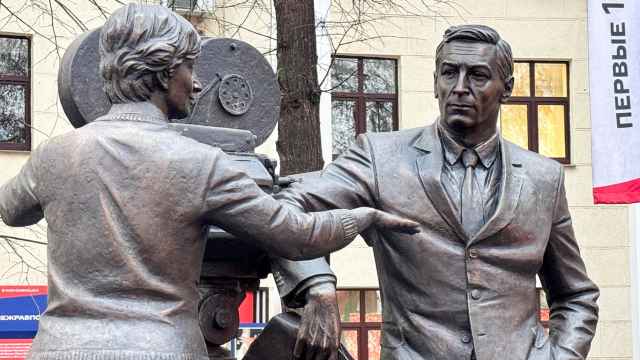The only other way to cram more young people into the Yermolova Theater last week would have been to sprinkle pheromones on the sidewalk along Tverskaya Ulitsa. That place was hopping like I may never have seen a theater hop anywhere.
The 700-seat hall was packed almost literally to the rafters. Every seat even in the distant balcony was taken. People without seats stood crammed two-deep all along both walls. Enormous crowds, making a din as they discussed what was going on, wandered the corridors and foyers of the theater, making me think of ant hills after a kid has stuck a stick down the hole and given it a vigorous twist.
The object of all this attention was the latest version of what is called the Theater Almanac, an occasional event created by an organization called Vottebe (which might be rendered loosely as Take That! or There You Have It!). It brings actors and young directors together to work on short dramatic sketches that are intended as possible prototypes for future productions. They are less than a preview of a future production, but more than just staged readings. The small companies of actors and directors have eight days to prepare a dramatic sketch that runs roughly 10 to 20 minutes.
Spectators last week voted for their favorite sketches and the Yermolova's artistic director Oleg Menshikov has said he will take the voting into account when considering whether he will choose to develop any of the sketches further.
This version of the Theater Almanac took place last week for the first time in a "regular" Moscow repertory house. In the past it has been held at the Meyerhold Center, which brought together independent directors and actors to work on sketches. This time all of the actors were drawn from the Yermolova company, giving the affair a certain homogeneity. What it also did was inject a strong dose of risk-taking into a repertory theater setting, which tends to be much more conducive to comfort and tradition than to experimentation.
One of the most interesting pieces, conceived by director Talgat Batalov and playwright Yekaterina Bondarenko, asked nine actors of the company to share their thoughts on what it means to be an actor in Russia. They answered questions such as, "What are theatrical continuity and the Russian theatrical tradition?" or, "What do you remember about the Stanislavsky System?" The answers, sometimes funny, often irreverent, and always sincere, were shaped by Bondarenko and based on actual conversations with the actors during the eight days of preparation.
Many of the sketches were directed by individuals who have begun making a name for themselves, but are still some way off from entering anything that could be called the mainstream. Aside from Batalov, they included Yury Muravitsky, Kirill Vytoptov, Sergei Aronin and Yury Kvyatkovsky.
But what was happening on stage was only part of the event. A live band played on the ground-floor foyer before the showings began, while two events took place upstairs — one a performance, the other a video and photo exhibit chronicling the eight days of preparation. Here, in filmed interviews conducted by young theater critics Natalya Bazova and Darya Aksyonova, we could listen to participants talk about themselves and their approach to their work.
More performances and pseudo-interviews took place in other foyer spaces during an expanded intermission. The performers in these mini-shows competed for attention with two packed snack bars, the perennial smoker's crowd on the street, and hordes of people roaming from one place to the next, trying to take it all in in one fell swoop. It made me think of an old-fashioned open-air market and, to an extent, that is what it was — an attempt to develop and "sell" a whole range of new theatrical "products," by which I mean "ideas."
This kind of event, workshop or almanac — call it what you will — has increasingly become a popular method for developing new theater in Moscow. The Playwright and Director Center has been using something similar for several years now as a way to determine what will be produced on its stages. For the record, its next workshop, the ninth in all, takes place from Feb. 2 to 4.
Now it would appear we may see at least one new show appear on the stage at the Yermolova thanks to last week's Theater Almanac.
Everything about this event suggested that the search for the proverbial "next big thing" is well underway in Moscow. Not only was the event well organized, but the response from the public and the professional community was nothing less than astonishing. It was a convincing sign that, whatever its shortcomings may be, the theater process in Moscow continues to be unexpected and vital.
A Message from The Moscow Times:
Dear readers,
We are facing unprecedented challenges. Russia's Prosecutor General's Office has designated The Moscow Times as an "undesirable" organization, criminalizing our work and putting our staff at risk of prosecution. This follows our earlier unjust labeling as a "foreign agent."
These actions are direct attempts to silence independent journalism in Russia. The authorities claim our work "discredits the decisions of the Russian leadership." We see things differently: we strive to provide accurate, unbiased reporting on Russia.
We, the journalists of The Moscow Times, refuse to be silenced. But to continue our work, we need your help.
Your support, no matter how small, makes a world of difference. If you can, please support us monthly starting from just $2. It's quick to set up, and every contribution makes a significant impact.
By supporting The Moscow Times, you're defending open, independent journalism in the face of repression. Thank you for standing with us.
Remind me later.






